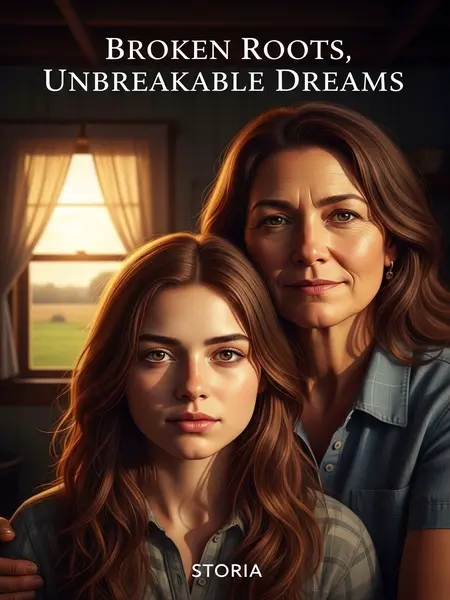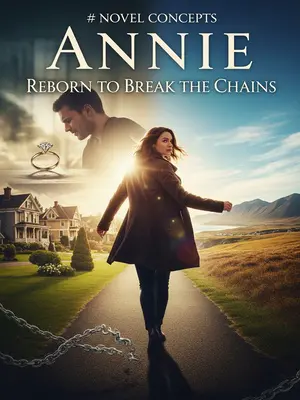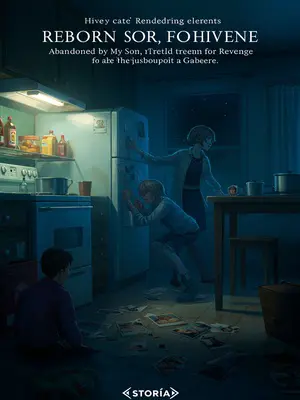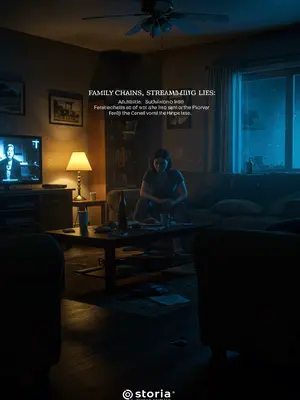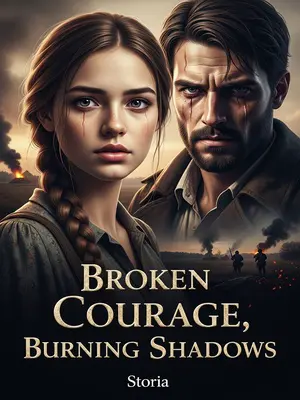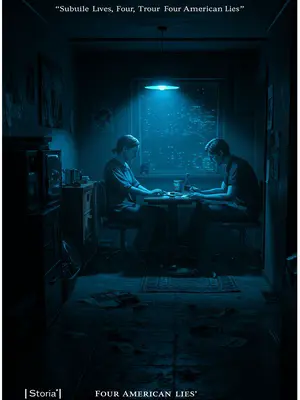Chapter 5: Bread, Books, and Promise
Frank ran off in a panic. I don’t know where he went. At least, during my two-month summer vacation, I never saw him again. (People said they saw him at a truck stop out on Route 66, but who knows?)
He disappeared into the night, leaving behind only the memory of his shadow in my doorway. I never wanted to see him again.
Mom dropped the broom, her eyes red, glaring at me. "Are you mute? Are you dead? Why didn’t you scream?!"
Her voice was sharp, but underneath it was worry—so much worry it hurt to hear. She was really yelling at herself, not me.
"Mom, I was scared."
My voice was barely a whisper. I looked down, ashamed of my fear.
After I said that, I lowered my head.
I waited for her to yell again, but instead she just sighed—a long, shaky breath that seemed to carry the weight of the world.
I was scared. I was afraid Mom would abandon me if she found out.
The thought haunted me, twisting in my chest. I didn’t want to lose her, not after everything we’d been through.
Mom was silent for a while, then sat on the bed and pulled me into her arms.
Her hug was fierce, almost crushing. I buried my face in her shoulder, letting the tears flow.
I buried my head in her embrace. That hug made me feel safer and more content than anything else.
For the first time in a long time, I felt like everything might be okay. Mom’s arms were the safest place in the world.
"Did you eat all these years for nothing? Who lets people push them around without fighting back? Don’t go around telling people you’re my daughter!"
She ruffled my hair, her voice rough but loving. I knew she was just scared, too—scared for me, scared for us.
In that moment, I finally knew—I was the one Mom chose.
Her love was fierce, messy, and real. I knew then that I belonged with her, no matter what.
The next morning, Mom took me to the women’s clinic at the hospital. I didn’t understand at the time, but when I learned biology in middle school, I realized.
She held my hand the whole way, her grip tight and unyielding. I didn’t ask questions—I just trusted her. (She needed a ride and a signed consent form, and we waited all day for the same-day procedure.)
The day Mom went to the hospital was the day she had an abortion.
It wasn’t until years later that I understood the sacrifice she made for me. She chose me, even when it cost her everything.
After the procedure, Mom was especially weak, her lips pale.
She tried to hide it, but I saw how much pain she was in. I wanted to take care of her, just like she always took care of me.
In the afternoon, Mom took a hoe and went to the fields.
She wouldn’t rest, no matter how much I begged. Work was her way of coping, of keeping the world at bay.
Gossipy Mrs. McCarthy didn’t mock me anymore. She just asked where Mom went.
Her voice was softer now, almost kind. I could tell she was worried, even if she didn’t say it outright.
When I told her Mom was in the fields, she said, "Honey, you’ve got a big heart. Your mom just had surgery this morning—how can she go work in the afternoon? Go get her back. This is like giving birth; she needs to rest, or she’ll have health problems later."
She took my hand, and we hurried to the fields. The summer sun was blazing, and after a short walk, my back was soaked with sweat.
We ran down the dusty path, the heat rising in waves off the ground. I could barely keep up with her.
I grabbed the hoe from Mom. "Mom, you just had surgery. Does it hurt?"
I tried to sound brave, but my voice wobbled. Mom just shook her head, wiping the sweat from her brow.
Mom glared at Mrs. McCarthy, wiped my tears, and said, "It doesn’t hurt, it doesn’t hurt. Don’t cry."
She pulled me close, her hands rough but gentle. I believed her, even if I knew it wasn’t true.
Back home, I threatened Mom for the first time.
I stood in the doorway, arms crossed, doing my best imitation of her stubbornness. “If you don’t rest, I won’t go to school.”
"If you don’t rest, I won’t go to school. I meant it."
It was the only leverage I had, and I used it for the first time. She looked surprised, then smiled.
At first, Mom was mad, but then she smiled at me. "Fine, I’ll rest, okay? But you have to study hard. I’m still counting on you to succeed and take care of me."
She winked, ruffling my hair. For once, I felt like I’d won a battle.
This time, I was truly grateful to Mrs. McCarthy. No matter how she treated me later, I never said a bad word about her.
I realized then that even the gossips had hearts. Sometimes kindness comes from the most unexpected places.
Most women in small towns are like this: gossipy but kind-hearted. They can’t stand to see you doing too well, but they don’t want you to suffer either.
Their words could hurt, but their actions spoke louder. In their own way, they looked out for each other.
Cooking naturally fell to me. Mom and my brother always complained my cooking was bad, but they ate every bite, saying not to waste food. (The smoke alarm squawked more than once.)
I tried new recipes, burned more than a few dinners, but nobody ever went hungry. Their teasing became a kind of love language between us.
The two-month holiday went by neither too fast nor too slow.
Each day blended into the next—chores, meals, laughter, and the quiet comfort of family.
Mom tidied up, put on her favorite blue dress, and styled her hair.
She always wore that dress on special occasions, smoothing the fabric with care. It made her look younger, happier.
She sent me to school, made my bed, and said, "This is your pocket money for the week. Spend it carefully. It’s not easy for me to make money."
She pressed a few crumpled bills into my hand, her eyes serious. I tucked them away, determined to make them last.
The living expenses for middle school were paid to the school—$300 per semester for activity fees and room and board back then.
I knew every dollar was hard-earned. I promised myself I’d make it worth her sacrifice.
During boarding at school, I went home once a week.
Those Fridays felt like Christmas morning. I’d count down the days, dreaming of Mom’s cooking and the sound of my brother’s laughter.
Mom gave me $10 pocket money per week, which was enough for me.
I learned to stretch every penny, buying only what I needed. The other girls complained, but I felt lucky to have anything at all.
From going home every day to once a week, I wasn’t used to it at first, especially lying in my dorm bed at dusk—I missed home terribly. The fluorescent hall light flickered, and the RA made her rounds, but it wasn’t the same as home.
Every Friday was my happiest time.
I’d run to the bus stop, my backpack bouncing, heart racing with anticipation. Home was always waiting.
"Autumn, I think I saw your mom today. She was selling pancakes at the Saturday farmers’ market on Main Street."
A classmate mentioned it offhand, not knowing how much it would mean to me.
A commuter kid mentioned it in passing.
The words stuck with me all day. I couldn’t stop picturing Mom behind a folding table, her hair tied back, flipping pancakes for strangers.
Later, I found out that while I was at school, Mom set up a stall in town selling pancakes.
She’d rise before dawn, kneading dough by the light of the kitchen lamp. I imagined her hands moving quickly, her face set in determination.
She got up before dawn to knead dough, left for town at daybreak, and came home in the afternoon to make dinner for my brother. After dinner, she still had to work in the fields.
She never complained, never asked for help. She just did what had to be done, day after day.
My heart felt heavy. I couldn’t quite describe it, but even breathing felt hard.
I lay awake that night, guilt gnawing at me. I wished I could do more, be more, for her.
If not for me, would Mom’s life be easier?
The thought haunted me, but I pushed it aside. I knew what I had to do—study harder, dream bigger, make it all worth it.
I shook my head, brushing the thought away. What I could do now was study hard and get into the city’s top high school.
